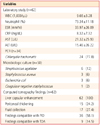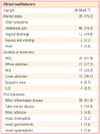Abstract
Objective
To analyze the clinical characteristics in patients of Fitz-Hugh-Curtis syndrome diagnosed by abdomino-pelvic computed tomography (CT).
Methods
We retrospectively examined the clinical courses of 62 patients who visited with abdominal pain from March 2005 to July 2010. The clinical manifestations, physical examination, laboratory manifestations, CT findings, treatments, and prognosis were analyzed.
Results
The mean age of the patients ranged from 13 to 48 years and their average age was 28.56±8.77. Twenty-eight of them (45.2%) were married but all the subjects had sexual experience. The chief complaints requiring a visit to the hospital were abdominal pain (74.2%), vaginal discharge (19.4%), nausea and vomiting (3.2%), and fever (1.6%). On physical examination, location of tenderness was right upper-quadrant tenderness (41.9%), whole abdomen (37.1%), right lower-quadrant (24.2%), lower abdomen (16.1%), and epigastric area (6.5%). The isolation of bacterial pathogens was found in 26% (13/62) of them. Polymerase chain reaction tests for Chlamydia trachomatis were positive in 34 patients (70.3%). All 62 cases showed liver capsular enhancement on CT in the early arterial phase. Peritoneal thickening (24.2%) and fluid collection (27.4%) were observed in the perihepatic area. Of 56 patients, 49 patients (87.5%) improved following antibiotic therapy and conservative care. Seven patients did not respond to antibiotic therapy, their symptoms improved after laparoscopic surgery.
Conclusion
For women of reproductive age with acute pain in the upper right abdominal alone or together with pain in the lower abdomen, Fitz-Hugh-Curtis syndrome should be suggested during examination. Moreover, in cases suspected to be Fitz-Hugh-Curtis syndrome, gynecologic examination, abdomino-pelvic CT, and tests for C. trachomatis could provide a more rapid and accurate diagnosis. Also, education and continuous follow up after therapy would be needed.
Figures and Tables
Table 2
Laboratory findings and computed tomography findings in patients with Fitz-Hugh-Curtis syndrome

Values are presented as mean±standard deviation (SD) or number (%).
WBC, white blood cell; ESR, erythrocyte sedimentation rate; CRP, C-reactive protein; AST, aspartate aminotransferase; ALT, alanine aminotransferase; PCR, polymerase chain reaction; PID, pelvic inflammatory disease; TOA, tubo-ovarian abscess.
References
1. Curtis AH. A cause of adhesions in the right upper quadrant. JAMA. 1930. 94:1221–1222.
2. Fitz-Hugh TJ. Acute gonococcic peritonitis of the right upper quadrant in women. JAMA. 1934. 102:2094–2096.
3. Muller-Schoop JW, Wang SP, Munzinger J, Schlapfer HU, Knoblauch M, Tammann RW. Chlamydia trachomatis as possible cause of peritonitis and perihepatitis in young women. Br Med J. 1978. 1:1022–1024.
4. Wang SP, Eschenbach DA, Holmes KK, Wager G, Grayston JT. Chlamydia trachomatis infection in Fitz-Hugh-Curtis syndrome. Am J Obstet Gynecol. 1980. 138:1034–1038.
5. Wolner-Hanssen P, Svensson L, Westrom L, Mardh PA. Isolation of Chlamydia trachomatis from the liver capsule in Fitz-Hugh-Curtis syndrome. N Engl J Med. 1982. 306:113.
6. Peter NG, Clark LR, Jaeger JR. Fitz-Hugh-Curtis syndrome: a diagnosis to consider in women with right upper quadrant pain. Cleve Clin J Med. 2004. 71:233–239.
7. Lee SC, Nah BG, Kim HS, Choi TH, Lee SH, Lee JY, et al. Two cases of Fitz-Hugh-Curtis syndrome in acute phase. Korean J Gastroenterol. 2005. 45:137–142.
8. Ji EY, Kwon YI, Kim MJ, Kim SY, Chung JE, Kim MR, et al. A case of Fitz-Hugh-Curtis syndrome diagnosed by pelvic CT imaging prior to diagnostic laparoscopy. Korean J Obstet Gynecol. 2005. 48:2005–2009.
9. Yang HW, Jung SH, Han HY, Kim A, Lee YJ, Cha SW, et al. Clinical feature of Fitz-Hugh-Curtis syndrome: analysis of 25 cases. Korean J Hepatol. 2008. 14:178–184.
10. Eschenbach DA, Holmes KK. Acute pelvic inflammatory disease: current concepts of pathogenesis, etiology, and management. Clin Obstet Gynecol. 1975. 18:35–56.
11. Onsrud M. Perihepatitis in pelvic inflammatory disease: association with intrauterine contraception. Acta Obstet Gynecol Scand. 1980. 59:69–71.
12. Risser WL, Risser JM, Benjamins LJ, Feldmann JM. Incidence of Fitz-Hugh-Curtis syndrome in adolescents who have pelvic inflammatory disease. J Pediatr Adolesc Gynecol. 2007. 20:179–180.
13. Paavonen J, Saikku P, von Knorring J, Aho K, Wang SP. Association of infection with Chlamydia trachomatis with Fitz-Hugh-Curtis syndrome. J Infect Dis. 1981. 144:176.
14. Kobayashi Y, Takeuchi H, Kitade M, Kikuchi I, Sato Y, Kinoshita K. Pathological study of Fitz-Hugh-Curtis syndrome evaluated from fallopian tube damage. J Obstet Gynaecol Res. 2006. 32:280–285.
15. Schoenwaelder M, Stuckey SL. Perihepatitis associated with systemic lupus erythematosus: computed tomography findings. Australas Radiol. 2005. 49:179–181.
16. Kim S, Kim TU, Lee JW, Lee TH, Lee SH, Jeon TY, et al. The perihepatic space: comprehensive anatomy and CT features of pathologic conditions. Radiographics. 2007. 27:129–143.
17. Choi TY, Kang JO, Chung SR, Ahn Y. Chlamydia trachomatis antibody in Fitz-Hugh-Curtis syndrome. Korean J Lab Med. 2008. 28:293–298.
18. Woo SY, Kim JI, Cheung DY, Cho SH, Park SH, Han JY, et al. Clinical outcome of Fitz-Hugh-Curtis syndrome mimicking acute biliary disease. World J Gastroenterol. 2008. 14:6975–6980.
19. Wang CL, Guo XJ, Yuan ZD, Shi Q, Hu XH, Fang L. Radiologic diagnosis of Fitz-Hugh-Curtis syndrome. Chin Med J (Engl). 2009. 122:741–744.
20. Ossewaarde JM, Rieffe M, Rozenberg-Arska M, Ossenkoppele PM, Nawrocki RP, van Loon AM. Development and clinical evaluation of a polymerase chain reaction test for detection of Chlamydia trachomatis. J Clin Microbiol. 1992. 30:2122–2128.
21. Lim SC, Park YW, Choi HJ, Kim YH. Clinical experiences of Fitz-Hugh-Curtis syndrome. Korean J Obstet Gynecol. 2006. 49:1738–1744.
22. McCormack WM. Pelvic inflammatory disease. N Engl J Med. 1994. 330:115–119.




 PDF
PDF ePub
ePub Citation
Citation Print
Print



 XML Download
XML Download